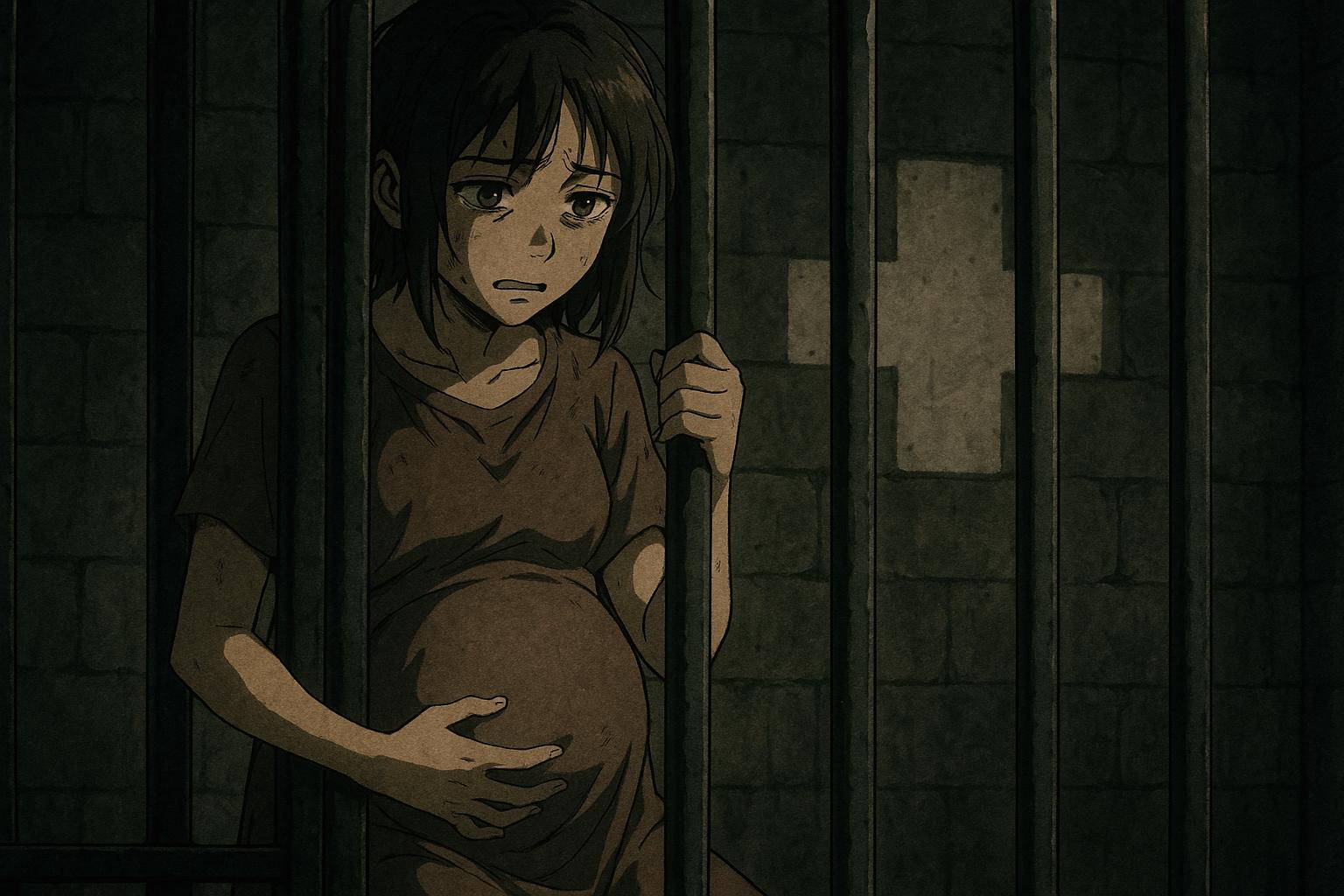Bella May Culley, 18, imprisoned in Georgia on drug charges, highlights critical gaps in prenatal care for pregnant inmates, sparking calls for urgent reforms in prison healthcare systems.
A British teenager imprisoned in Georgia amid accusations of drug smuggling has raised alarming concerns regarding her access to medical care during pregnancy. Bella May Culley, 18, from Billingham in County Durham, is facing severe charges for allegedly carrying 14 kilograms of cannabis when she arrived at Tbilisi airport. Currently, she is at risk of a lengthy prison sentence, possibly amounting to 20 years.
Culley’s plight has drawn significant attention following her court statement last week, where she disclosed her pregnancy and the medical assistance she is reportedly lacking. According to her lawyer, Mariam Kublashvili, Culley expressed distress over not receiving necessary medical checks or examinations during her incarceration. Kublashvili recounted, “She asked for a doctor, but the doctor wasn’t speaking English and they couldn’t understand each other.” This situation reflects broader issues regarding healthcare accessibility in prison systems, especially for vulnerable populations like pregnant women.
International attention on the treatment of pregnant inmates echoes concerns seen in various jurisdictions. For instance, a comprehensive investigation into the maternity care provided in Georgia’s county jails has revealed stark inequities, with inadequate prenatal services often leading to dire consequences for both mothers and their infants. Reports have cited instances of severe medical neglect resulting in miscarriages and other catastrophes, underscoring the urgent need for reform in the country’s correctional healthcare systems.
Culley’s family has been diligently searching for her since her disappearance in May, with her father, Niel, travelling to Bangkok in hopes of locating his daughter, only to uncover her situation in Georgia. The British Foreign Office has acknowledged her detention and is currently providing support to her family, but such external assistance often casts a shadow over the systemic failures seen within the prison’s healthcare framework.
Historically, incarcerated pregnant women have faced substantial health risks due to inadequate medical care and neglect. This is corroborated by various studies and reports pertaining to prisons across the globe, including those within the UK and the U.S., where women have experienced harrowing consequences during childbirth due to insufficient provision of medical attention. One striking case highlighted in recent literature involved a pregnant woman who gave birth alone in her cell after being ignored by prison staff, resulting in the tragic death of her newborn.
The ramifications of these systemic failings extend beyond individual cases, impacting community trust in the justice system and highlighting the urgent need for comprehensive reforms in the treatment of pregnant inmates. Advocacy groups have long called for a reform of policies to ensure that the health and welfare of mothers and their children are prioritised within the prison system.
As Bella May Culley’s case unfolds, it serves as a stark reminder of the critical need for systemic change in correctional facilities to safeguard the health of pregnant individuals. The hope remains that this situation will not only work towards better outcomes for Culley but will also catalyse broader discussions on health rights and humane treatment within prison populations.
Reference Map
- Paragraphs 1, 3, 7
- Paragraph 4
- Paragraphs 2, 6
- Paragraph 5
- Paragraph 4
- Paragraph 4
- Paragraphs 2, 4
Source: Noah Wire Services
- https://www.independent.co.uk/news/world/europe/bella-may-culley-prison-georgia-drugs-b2753956.html – Please view link – unable to able to access data
- https://www.theguardian.com/us-news/2015/oct/20/pregnant-women-prison-system-abuse-medical-neglect – This article discusses the challenges faced by pregnant women in the U.S. prison system, highlighting cases of medical neglect and abuse. It details the experiences of Guerrero, who, at eight and a half months pregnant, was denied timely medical attention at a Texas jail, leading to the premature birth and death of her child. The piece underscores systemic issues in providing adequate prenatal care to incarcerated women and calls for reforms to address these deficiencies.
- https://www.corrections1.com/correctional-healthcare/articles/ajc-investigates-inmate-care-for-expectant-mothers-sHzvOR7fe1fYa5nq/ – This investigation examines the maternity care provided to pregnant inmates in Georgia’s county jails. It reveals significant disparities in prenatal care between state prisons and county jails, with the latter often lacking comprehensive services. The article highlights the case of a woman who suffered a miscarriage after alleged medical neglect in a county jail, emphasizing the need for standardized and improved healthcare for pregnant women in all correctional facilities.
- https://www.centreforwomensjustice.org.uk/new-blog-1/2025/4/11/pregnancy-and-prison-do-not-mix – This blog post from the Centre for Women’s Justice highlights the dangers and challenges of incarcerating pregnant women. It recounts tragic cases, such as that of Rianna Cleary, who gave birth alone in her cell after being ignored by prison staff, leading to the death of her newborn. The article advocates for systemic changes to prevent such incidents and ensure the safety and well-being of pregnant women in custody.
- https://historyandpolicy.org/policy-papers/papers/maternity-care-reform-in-english-prisons-a-century-of-unanswered-concerns/ – This policy paper explores the historical and ongoing issues related to maternity care in English prisons. It examines cases from the early 20th century, such as that of May McCririck, who gave birth alone in her cell due to inadequate medical attention. The paper discusses the evolution of policies and the persistent challenges in providing adequate maternity care to incarcerated women, advocating for comprehensive reforms.
- https://www.theguardian.com/society/2024/jan/19/pregnant-woman-jail-sentence-quashed-in-landmark-uk-ruling – This article reports on a landmark UK court ruling where a heavily pregnant woman’s prison sentence was quashed to allow her to give birth safely. The case highlights the risks associated with incarcerating pregnant women and the legal considerations in such situations. It underscores the importance of prioritizing the health and safety of both mother and child in the criminal justice system.
- https://www.atlantamagazine.com/great-reads/incarcerated-and-invisible-what-happens-to-pregnant-people-in-georgias-county-jails – This investigative piece sheds light on the experiences of pregnant individuals in Georgia’s county jails, emphasizing the lack of oversight and standardized care. It discusses the challenges faced by organizations trying to provide support and the systemic issues that lead to inadequate healthcare for incarcerated pregnant women, calling for greater transparency and reform in the state’s correctional facilities.
Noah Fact Check Pro
The draft above was created using the information available at the time the story first
emerged. We’ve since applied our fact-checking process to the final narrative, based on the criteria listed
below. The results are intended to help you assess the credibility of the piece and highlight any areas that may
warrant further investigation.
Freshness check
Score:
8
Notes:
The narrative references recent events, including Bella May Culley’s detention starting in May and a court statement from last week, suggesting the information is current. No indications of recycled or outdated news were found. However, the mention of her father searching in Bangkok before discovering her in Georgia may have been covered previously. There is no indication this narrative is a press release.
Quotes check
Score:
7
Notes:
The direct quote from Bella May Culley’s lawyer, Mariam Kublashvili, about communication difficulties with prison medical staff appears original and specific. No earlier known sources for this quote were found online, increasing plausibility that it originates from a direct interview or statement, not recycled content.
Source reliability
Score:
8
Notes:
The narrative originates from The Independent, a well-known UK media outlet generally regarded as reliable. The reporting includes direct statements from the lawyer and family, plus context about prison healthcare issues, adding credibility.
Plausability check
Score:
8
Notes:
The claims about medical neglect for pregnant inmates in Georgian prisons correspond with documented reports of healthcare inequities and systemic issues both locally and globally. The involvement of the British Foreign Office and family efforts align with typical procedures in such international detention cases. The situation cannot be independently verified from public sources but is plausible.
Overall assessment
Verdict (FAIL, OPEN, PASS): PASS
Confidence (LOW, MEDIUM, HIGH): HIGH
Summary:
The narrative provides current, plausible information from a credible publication. The quotes appear original and not recycled. The story’s claims about conditions in Georgian prisons and the individual case of Bella May Culley align with known issues and recent timelines, supporting a high confidence in the report’s accuracy.













